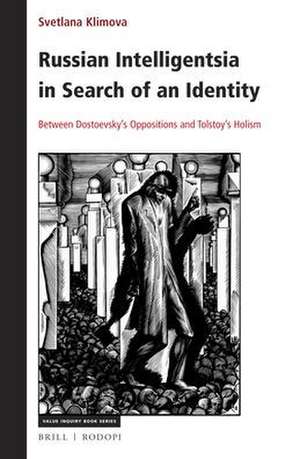Russian Intelligentsia in Search of an Identity: Between Dostoevsky’s Oppositions and Tolstoy’s Holism: Value Inquiry Book Series / Contemporary Russian Philosophy, cartea 355
Autor Svetlana Klimovaen Limba Engleză Hardback – 16 sep 2020
Preț: 630.44 lei
Preț vechi: 768.83 lei
-18% Nou
Puncte Express: 946
Preț estimativ în valută:
120.64€ • 126.11$ • 101.95£
120.64€ • 126.11$ • 101.95£
Carte indisponibilă temporar
Doresc să fiu notificat când acest titlu va fi disponibil:
Se trimite...
Preluare comenzi: 021 569.72.76
Specificații
ISBN-13: 9789004440609
ISBN-10: 9004440607
Dimensiuni: 155 x 235 mm
Greutate: 0.48 kg
Editura: Brill
Colecția Brill
Seria Value Inquiry Book Series / Contemporary Russian Philosophy
ISBN-10: 9004440607
Dimensiuni: 155 x 235 mm
Greutate: 0.48 kg
Editura: Brill
Colecția Brill
Seria Value Inquiry Book Series / Contemporary Russian Philosophy
Cuprins
Abstract
Acknowledgmentsx
Notes
Introduction
1 The Rise of the Russian Intelligentsia
1.1 The Historic Origins of Binary Consciousness
1.2 The Eighteenth Century and the Birth of Humanism
1.3 Pyotr Chaadayev and the Nineteenth Century: from Dialogues with Power to Public Discussion and Binary Consciousness
1.4 The Third Path of Russian Intellectualism
1.5 Russian Intelligentsia: history and Fate
1.6 The ‘Holiness’ of the Russian Intelligent
2 Fyodor Dostoevsky’s Ideology and Mythmaking
2.1 Dostoevsky’s Authorial Myth
2.2 Binary Code in Dostoevsky’s Worldview
2.3 The National Question in the Mirrors of Religion and Existential Philosophy
3 The Rise of the Philosophy of Life:Between Nikolay Strakhov and Lev Tolstoy
3.1 Nikolay Strakhov’s Mediation between Dostoevsky and Tolstoy
3.2 The Philosophical Dialogue of Tolstoy and Strakhov
3.3 Tolstoy the Philosopher
4 Tolstoy’s Social-Religious Teaching: Presentiments of the Twentieth Century
4.1 Tolstoy through the Prism of the Intelligentsia
4.2 Evil in Politics and Philosophy: ‘Who Is To Blame?’
4.3 The Amelioration of Evil: ‘What Are We To Do?’
4.4 Twentieth-Century Political Philosophy: Tolstoy, Weber, Arendt
4.5 The National Question in the Mirror of Tolstoy’s Art
Postscript
Acknowledgmentsx
Notes
Introduction
1 The Rise of the Russian Intelligentsia
1.1 The Historic Origins of Binary Consciousness
1.2 The Eighteenth Century and the Birth of Humanism
1.3 Pyotr Chaadayev and the Nineteenth Century: from Dialogues with Power to Public Discussion and Binary Consciousness
1.4 The Third Path of Russian Intellectualism
1.5 Russian Intelligentsia: history and Fate
1.6 The ‘Holiness’ of the Russian Intelligent
2 Fyodor Dostoevsky’s Ideology and Mythmaking
2.1 Dostoevsky’s Authorial Myth
2.2 Binary Code in Dostoevsky’s Worldview
2.3 The National Question in the Mirrors of Religion and Existential Philosophy
3 The Rise of the Philosophy of Life:Between Nikolay Strakhov and Lev Tolstoy
3.1 Nikolay Strakhov’s Mediation between Dostoevsky and Tolstoy
3.2 The Philosophical Dialogue of Tolstoy and Strakhov
3.3 Tolstoy the Philosopher
4 Tolstoy’s Social-Religious Teaching: Presentiments of the Twentieth Century
4.1 Tolstoy through the Prism of the Intelligentsia
4.2 Evil in Politics and Philosophy: ‘Who Is To Blame?’
4.3 The Amelioration of Evil: ‘What Are We To Do?’
4.4 Twentieth-Century Political Philosophy: Tolstoy, Weber, Arendt
4.5 The National Question in the Mirror of Tolstoy’s Art
Postscript
Notă biografică
Svetlana Klimova, D.Sc., is Professor of Russian Studies at National Research University Higher School of Economics, Moscow. She has published more than 200 articles and 4 monographs about the history of Russian philosophy and culture, including A Phenomenology of Holiness and Passion in Russian Philosophy of Culture (2004).





